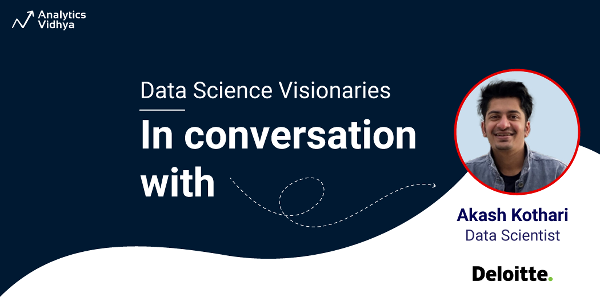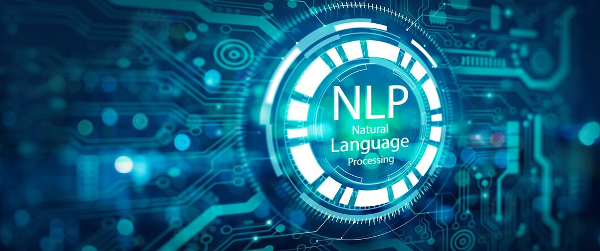Introduction
Welcome to the thrilling and compelling conversation with Akash Kothari, one of our success stories and speakers at Data Science. In this interview, he spills some beans on his educational journey, career, and path to becoming a successful Data Scientist.
Do you want to become a Data Scientist? Check out this Roadmap towards your data science journey.
Akash was born and raised in Mumbai and completed his engineering from St. John College of Engineering, Mumbai University. Overall, his educational journey has taught him the importance of continuous learning and personal development. He is always looking for new opportunities to learn and grow. He believes that his academic background and experiences have prepared him well for the challenges and opportunities that lie ahead.

Interview Excerpts with Akash Kothari
AV: Can you describe the moment or experience that sparked your passion for data science, and how did this shape your career path?
Akash: I have always been fascinated by the power of data and its potential to drive insights and decision-making. I remember working on a project during my studies where we analyzed a large dataset to identify patterns in customer behavior. There I came across Python and Data Science abilities. I was immediately drawn to the intersection of Natural Language Processing, statistics, computer science, and domain expertise that data science represents.
Since then, I have taken various courses and workshops in data science, participated in hackathons and data challenges, and worked on several projects in the field. These experiences have shaped my career path and helped me develop a strong foundation in data analysis, machine learning, and programming.
I am passionate about using data to drive insights and solve complex problems.
AV: Having worked as a senior systems engineer, what steps did you take to gain the necessary skills and knowledge to succeed in the field of data science?
Akash: My first job was with Infosys, and when I started my training there in Mysore, it was comparable to the ninth semester of an engineering program in that we were trained in many languages and different business use cases and were expected to pass exams in those areas. I developed an interest in machine learning and Python.
Initially, I was deployed on a Java Project, But I needed a transition from Java to Data science. I took several courses and workshops in data science, statistics, and machine learning to do this. I also participated in online communities and forums to stay up-to-date on the latest trends and techniques in the field. Additionally, I worked on various personal projects and Kaggle competitions to apply my learning in real-world settings and gain practical experience.
One of my most valuable steps was collaborating with other field professionals. I sought out mentorship from experienced data scientists, attended industry conferences and events, and joined data science communities and groups. This allowed me to learn from others and develop my skills in a supportive and collaborative environment.

AV: What is the biggest challenge you have faced in your career as a data scientist, and how did you overcome it?
Akash: One of the biggest challenges I faced as a data scientist was working on a project where the data was highly messy and inconsistent. The data had been collected over a long period and from different sources, resulting in missing values, duplicates, and conflicting information.
I had to spend significant time cleaning and pre-processing the data to overcome this challenge. In addition to data cleaning, I also had to consider handling missing values and outliers and determine the best approach to imputing and transforming the data.
This experience taught me the importance of data preparation and how it can significantly impact the quality and effectiveness of data-driven models and insights. It also taught me the value of collaboration and seeking input from domain experts to ensure the accuracy and relevance of the data.
AV: Can you describe your ideal career trajectory, and how does this align with your goals for the next five years?
Akash: My ideal career trajectory involves continuous learning and growth in the field of Natural Language Processing and data science. In the next five years, I would like to work on projects that significantly impact business and society, such as developing predictive models or building large language models.
I also envision myself becoming an expert in a specific domain or industry. This would allow me to develop a deep understanding of the challenges and opportunities in these industries and use data science to drive innovation and change.
Overall, my goal is to be a valuable contributor to the field of data science and make a meaningful impact through my work. I believe that the next five years will be a critical period of growth and development for me, and I am committed to continuously improving and expanding my skills and knowledge.

AV: Can you describe a recent project you have worked on, and what were some key insights or takeaways you gained from the experience?
Akash: Recently, I worked on a project that involved developing a model to measure the semantic similarity between skills. The goal was to identify whether two skills conveyed the same meaning or not, which is a critical task in natural language processing.
To achieve this, we developed our own corpus using a large dataset of skills and also used a couple of pre-trained models.
One key takeaway from this project was the importance of selecting the right evaluation metrics to assess the model’s performance. We used several metrics, such as cosine similarity and Pearson correlation coefficient, to evaluate the model’s ability to predict the similarity scores of new skill pairs.
Another critical insight was the importance of pre-processing and cleaning the data to improve the model’s accuracy. We experimented with different techniques for removing stop words, stemming and lemmatizing the skills, and handling rare words and out-of-vocabulary terms.
AV: How have your past projects and experiences shaped your approach to your current work, and what lessons have you carried forward into your current project?
Akash: My past projects and experiences have played a significant role in shaping my approach to my current work in data science. One lesson I have carried forward from my previous work is the importance of thoroughly understanding the problem domain and the business context of the project. In my past projects, I have seen firsthand the impact of developing solutions without a clear understanding of the problem or the stakeholders’ needs. As a result, I now spend considerable time at the beginning of a project to ensure that I deeply understand the problem domain and the stakeholders’ requirements.
Also learned the importance of iterative and agile development methodologies in my past projects. By breaking down the project into smaller milestones and iterating on the solution, I have found it easier to manage the project’s complexity and deliver high-quality solutions that meet the stakeholders’ needs.
In my current project, I have carried forward these lessons and applied them to my approach. By thoroughly understanding the problem domain and stakeholders’ requirements, collaborating closely with my team members and stakeholders, and adopting an iterative development approach, I believe that we can deliver a high-quality solution that meets the stakeholders’ needs and drives business value.

AV: What are some of the most interesting or innovative data science techniques or technologies you have worked with, and how have they impacted your work?
Akash: I have worked with several interesting NLP techniques and technologies in my career as a data scientist. One technique that I find particularly fascinating is sentiment analysis, which involves classifying text data according to the writer’s emotions or opinions. Sentiment analysis is a valuable tool in many industries, such as marketing and customer service, where it is critical to understand how customers feel about products and services.
Apart from that, I have worked in Transfer Learning and several Pre-Trained language models that are trained on vast amounts of text data and can be used as a starting point for a wide range of NLP tasks, including text classification, language translation, and text generation.
Overall, these techniques and technologies have significantly impacted my work as a data scientist, enabling me to build more accurate and sophisticated models and communicate complex data insights.
AV: How do you stay motivated and engaged when working on long-term or complex projects, and what strategies have you found effective for managing these projects?
Akash: Working on long-term or complex projects can be challenging and requires sustained motivation and engagement over an extended period. Here are some strategies that I have found effective for staying motivated and managing these types of projects:
- Break the project into smaller tasks.
- Set specific goals and deadlines.
- Maintain open communication with a team member.
- Take breaks and recharge.
- Celebrate milestones and successes.
AV: Looking back on your career as a data scientist, what are 3 things you are most proud of, and how have they helped you shape as a person?
Akash: Looking back on my career as a Data Scientist, there are several things that I am proud of. Here are three that stand out:
- The Transition from Java to Python and to Data Scientist: This keeps me motivated and reminds me that everything you put your mind to can be accomplished if you desire to learn it.
- Developing and Implementing an Innovative Natural Language Processing Algorithm: I am proud of my work in developing and implementing a semantic similarity algorithm for a natural language processing project. This was a complex project that required a lot of research and experimentation.
- Winning a Hackathon: 2nd Runner up out of 212 participant teams, 367 professionals, 264 prediction submissions.
AV: What advice would you give someone interested in pursuing a career in data science, and what skills or qualities do you believe are most important for success in this field?
Akash: Develop a strong foundation in mathematics and statistics: Data science involves a lot of statistical analysis and mathematical modeling. Therefore, having a solid foundation in these areas is crucial.
- Learn Programming Languages: Knowing how to program is a fundamental skill for data science. Learning programming languages such as Python, R, and SQL can help you in your journey.
- Gain Domain Expertise: It’s important to have domain expertise in the area you want to work in. This will help you understand the data and draw meaningful insights from it.
- Build a Portfolio: Creating a portfolio of your data science projects can help you showcase your skills and experience to potential employers.
- Stay up to Date: The field of data science is constantly evolving, so it’s essential to stay up to date with the latest technologies and techniques.
And to all who are entirely new to this, I will suggest that there is immense knowledge available over the Internet. Just go and grab it by deciding which area you want to explore.
Conclusion
Parting ways, this interview with Akash Kothari highlighted the comprehensive skill set and expertise required for success in this sector. The position of a data scientist is both demanding and rewarding, requiring the capacity to analyze and interpret massive datasets and the necessity of communication and collaboration with stakeholders. If you want to become a Data Scientist, then, check out our course.
Furthermore, the conversation emphasized the need for continuing education and remaining current with the latest technology and trends. The discipline of data science is continually growing, and adaptability and flexibility are essential for success. Overall, the interview provided essential insights into the world of data science and the abilities and characteristics required to flourish in this interesting and developing industry.





